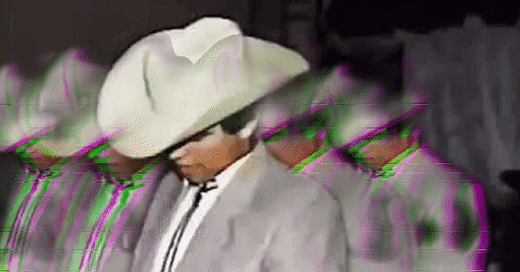Recently, a video of Chalino Sánchez, the legendary writer and performer of Mexican corridos, went viral on TikTok. The video shows him reading a note given to him in the middle of a performance of “Alma Enamorada” (A Soul in Love) in Culiacán, Sinaloa, on May 15, 1992.
For years, the contents of this note have been debated amongst his fans and the general public. All we know for certain is that after reading the note, Chalino’s countenance fell, visibly shaken. He then continued singing his most popular song, and was found dead the next morning with two bullet holes in his skull.

It is generally accepted that the note had some sort of death threat, although we will probably never know for certain. The romanticized telling of the story states that the note probably contained a message indicating that “if you keep on singing, we will kill you.” If true, this would turn Chalino’s decision to keep singing into an act of incredible courage.
Regardless of what the note said, Chalino, by virtue of his craft, lived a life of true danger–that of a bard whose head the king could decide to take at any moment. Furthermore, it is an affirmation that the true value of art transcends life itself…it is something worth dying for. The bravado this life requires is sorely lacking in most of popular musicians of today. The general public has noticed this absence and is crying out for its return, as well as jeering at the phonies and pretenders, who claim to be brave while risking nothing.
On December 31st, during a live New Year’s performance, the band Green Day took a jab against former President Trump when they changed the lyrics to their song “American Idiot.” They replaced the line “Well maybe I’m the faggot America. I’m not a part of a redneck agenda,” with “I’m not a part of the MAGA agenda”. This move was widely mocked online as fake rebelliousness–a formulaic and overly-cliche critique of a political and cultural movement that lacks real institutional and cultural power as of today. Green Day risked nothing with their performance…some may argue that they never have. The display had a similar flavor to those of contemporary artists, who mock Christians with bodily fluids by putting the Crucifix in a glass full of their piss.
The horse is dead; it will not bite. And yet they keep on kicking.
Conservatives are just as guilty of this brand of faux edginess. Last year, country singer Jason Aldean released “Try That In A Small Town,” in which he warns liberals of the consequences of taking their shenanigans to rural America. These empty threats are evidently masturbatory coal for conservatives, who are set on painting themselves as the unwavering protectors of a now mostly dead, jingoist American ideal when, in reality, they have done nothing but give into every culturally progressive exigency like good boys for years while frowning and letting you know they are not happy about it.
Both of these examples have been labeled as the worst thing one can be in the world of music: kitschy and cringe. Even though the public can be gaslit into believing that the dominant culture is, in fact, the counterculture, young people conserve an instinct for phoniness by which they can generally discern fake edginess and immediately reject it. They are the epitome of the term “controlled opposition.”
Green Day and Jason Aldean are far from the only examples of this. However, there seems to be a short supply of true contemporary counter-examples, where popular artists have put themselves on the line in their work, be it physically or socially. The result has been a music and art scene that is vapid, stale, and repetitive, in which little value is found in anything new. Worst of all, it’s just boring.
It may seem strange that young people have decided to quench this thirst for artistic bravery in someone like Chalino Sánchez. However, his rise in the collective consciousness of Americans follows a recent popularization of corridos and ranchero music that is exemplified by the young singer Peso Pluma (Featherweight), who recently made it into Spotify’s top ten most listened-to artists in 2023.
Older Americans may be reluctant to accept the artists of this genre as paradigms of virtue and, to be fair, Chalino is far from an exemplary person in all regards. Corridos are generally frowned upon even in Mexico because of their “glorification of violence,” as well as for their general lack of artistic quality. Many corrido singers have been accused and tried in Mexico for apología del delito (crime apologetics), a crime by which a person justifies and promotes illegalities. A listen to Chalino’s oeuvre will lead anyone to the conclusion that he is not merely singing about the subject of narco-violence, but in some cases is actively promoting and cheering on a certain side in the narco war.
One may recognize certain parallels between the ways both corridos and American hip hop songs include themes about crime, drug trafficking, and commentary on the “powers that be” in society. And while certain rappers certainly have influence–for better or worse–in social and political affairs of their locales, the relationship between the corrideros and local affairs is indeed quite particular.
For all of their criminality and morally concerning affairs, narcos are not viewed solely as mere gangsters by all Mexicans. Instead, some view them as a type of cacique: a local leader with outsized influence in a community. The narco generally strives to be loved and respected in his territory. He achieves this by investing in it.
His money can go to infrastructure, educational, and agriculture projects, as well as security for those who live in his territory and are loyal to him or the cartel. The goodwill of the locals is generally essential to the narco, which is why the cartels have a genuine interest in controlling the communicators of their stories to the public: corrido singers. Like a true bard, the corrido performer takes the side of his king (the narco or cartel leader), glorifies his accomplishments, and belittles his rivals. As an artist, this is an exceptionally dangerous place to live in, given the cartels’ willingness to dispatch anyone who poses a threat to their operations.
To be a corrido singer is to live at risk by default. Chalino is far from the only performer to be (presumably) murdered by the cartels. Sergio Vega and Valentín Elizalde suffered similar fates. Some might argue that there is no bravery in the life of these performers, only foolhardiness, that a man who has sought out the life of art in this genre has forfeited it. He who lives by the sword, or in defense of the sword, will inevitably die by the sword. This may be true, but it leaves out the fact that the lives of these men are complicated and are lived out in a world that, though perhaps not physically very far from our own, couldn’t be further apart in social contexts.
In a way, Chalino didn’t choose the life of the narcocorrido; it chose him. When he was young, his brother Armando was assassinated in the city of Tijuana, and the violence that Chalino would become all too familiar with entered his life. He sang about this event and others similar to it. The corrido was a way of bravely confronting and describing the world that he knew and could not choose to easily escape from. Chalino chose a side because he had to. It was by no means a “good” side–but, then again, the pickings for him were slim.
A more nuanced take would encourage us to admire the virtues of a man like Chalino while taking valuable lessons from his less desirable traits. Chalino was brave because he was a true man in the arena. He knew the dangers of the life he led, but met those dangers head-on. He accomplished one of the most important tasks of great artists: He took the task of speaking truthfully about the world upon himself. This is what is sorely missed in today’s musicians. Little of value is ever accomplished in safety or in fear of death or ruin.
Chalino rejected that fear. In the face of death, he kept on singing. Nunca tuvo miedo.







This is an excellent post. Thanks for sharing, German. Each generation of men seeks for a model of bravery and virility, respectable virtues of great men. Stories like Chalino's will always resurface when true masculinity is scarce in cultural portrayals.
Nmms